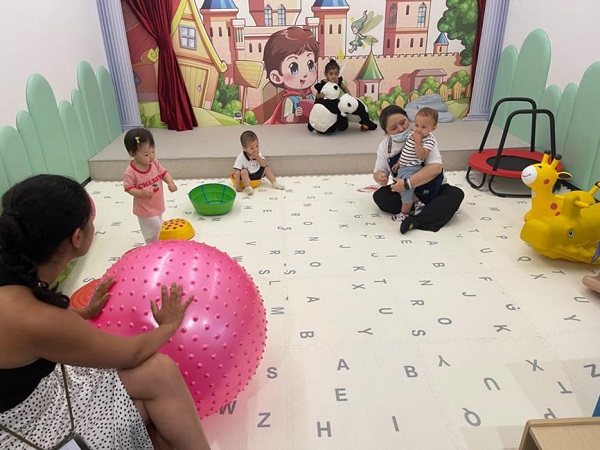More childcare services nationwide aim to reduce burden on families

Young children play at the day care center of Jiangning Road subdistrict in Jing'an district, Shanghai. [Photo by Gu Yingjie/chinadaily.com.cn]
China will ramp up efforts to enhance childcare services by increasing the number of slots nationwide and cultivating more professional talent, according to a report recently presented at a session of the Standing Committee of the National People's Congress.
Lei Haichao, head of the National Health Commission, said the country aims to increase the number of nursery care slots per 1,000 people to 4.5 by the end of 2025.
By the end of last year, China had provided 4.77 million nursery care slots nationwide and the number of slots per 1,000 people had reached 3.38, including community-based childcare, employer-run nurseries, family daycare and comprehensive childcare centers.
Meanwhile, more than half of the 1.12 million full-time employees in the sector were nursery care workers, Lei said.
A total of 1,315 counties across China introduced support measures such as childcare vouchers for families and operational subsidies for nurseries from 2021 to 2024, he added.
However, China still faces an uphill battle in providing enough childcare slots, Lei said.
Currently, over 30 percent of families with children under 3 years old have a need for nursery care, while the national enrollment rate is only 7.86 percent on average, according to surveys conducted by local health authorities.
Most of the nurseries are run by private organizations in commercial buildings, with rent and labor costs accounting for over 75 percent of their total revenue.
"Approximately 70 percent of these institutions operate at a loss," Lei said.
Last year, private childcare institutions accounted for 89.5 percent of all nursery providers nationwide, charging an average of 1,978 yuan ($277.70) per child a month.
In first-tier cities, the monthly fee per child can exceed 5,500 yuan, making the service unviable for many families.
As a result, nearly half of the childcare spots available were not in use last year, Lei said.
In addition, parents lack confidence in nursery care, as the quality varies widely, he added.
"Developing childcare services can help reduce the burden on families and boost fertility rates," Lei said, adding that it can also contribute to creating jobs.
Multiple measures will be taken to supplement nursery care facilities, with a focus on renovating and utilizing idle properties.
Kindergartens are encouraged to enroll children age 2 to 3 and provide childcare services, while employers and communities will also be supported to establish related facilities and increase supply through multiple channels, Lei said.
Vocational schools and general universities are encouraged to offer programs related to nursery care, enhancing the effectiveness of talent training for the sector, he added.
"We will further advance childcare services to better meet public demand, promote the healthy growth of infants and toddlers, and provide strong support for promoting balanced population development," he said.
- Chinese president appoints new ambassadors
- Top legislature schedules upcoming session in October
- China's top legislator meets Liberian senate president pro tempore
- China's top legislator meets Cambodia's National Assembly president
- China urges Group of Friends of Neutrality members to reform and improve global governance



